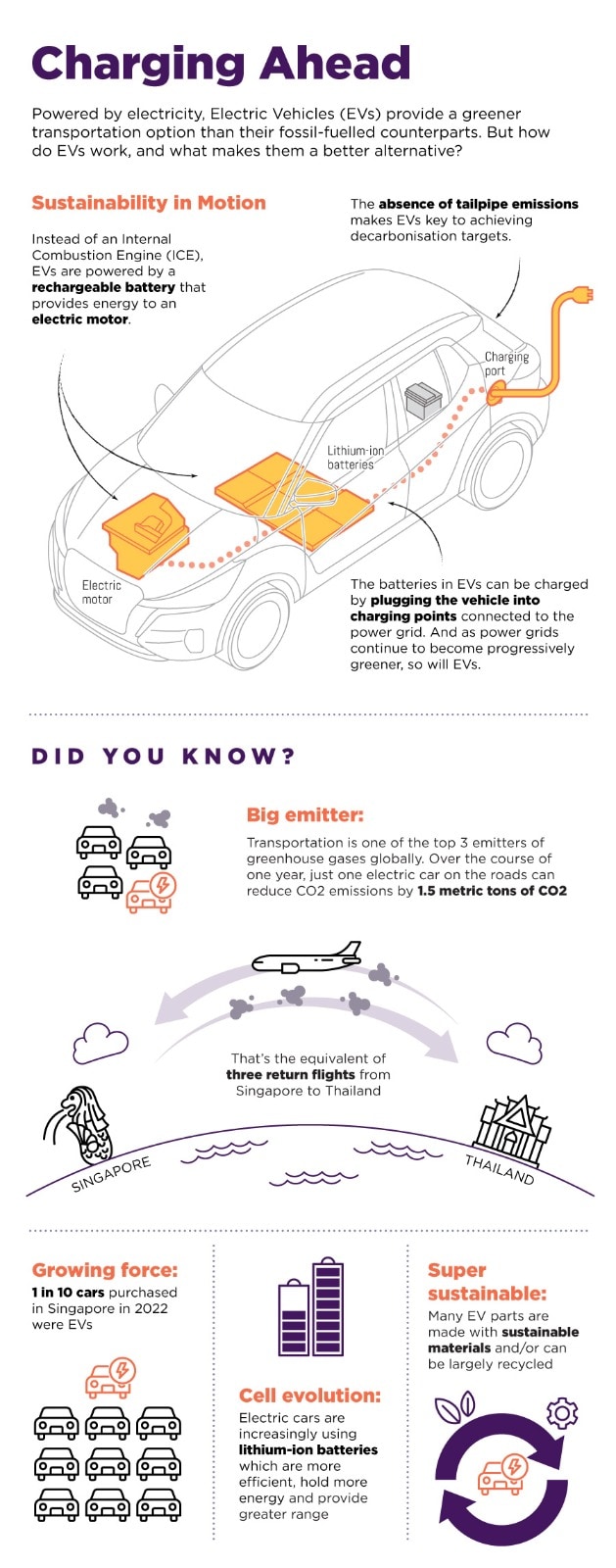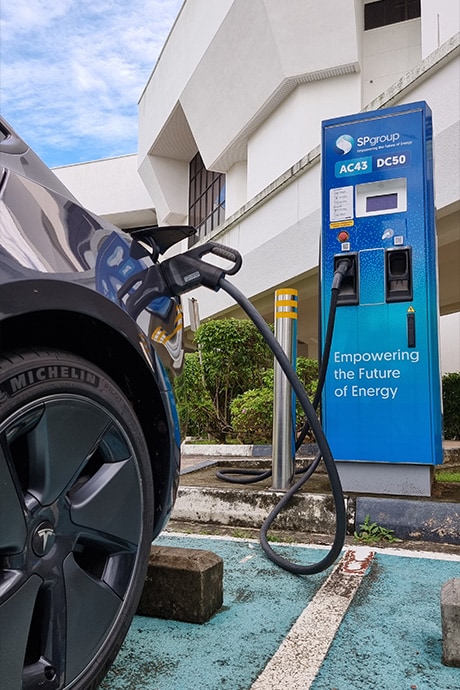Burning Questions: The Future of Electric Vehicles in Singapore
Burning Questions: The Future of Electric Vehicles in Singapore
In Brief
- Electric vehicles (EVs) can play a key role in climate change mitigation by reducing carbon emissions on roads
- SP Group is accelerating EV adoption in Singapore through an island-wide network of charging stations
- Specific benefits of an EV vary from model to model, but a typical car can charge to 80 percent in 30 minutes
Singapore aims to have all vehicles powered by cleaner energy by 2040. How will that vision become reality? In the first part of a new series, we answer your burning questions about the road ahead for green transport.
The world is starting to change its relationship to car ownership, but weaning ourselves off fossil fuel-powered rides isn’t easy. Singapore is well-connected by its world-class public transportation system — but there is still a significant demand for cars.
Slowing down the reliance on fossil fuel transport is a tricky task. There are still approximately one million vehicles on Singapore’s roads. This is bad news for the environment. In 2021, global carbon emissions reached 36.3 billion tonnes, a significant increase from 25.2 billion tonnes in 2000. With the world’s carbon emissions reaching an all-time high, there is an urgent need to change how we live and travel.
In Singapore, approximately 95 percent of electricity is produced using natural gas, one of the cleanest fossil fuels.
Mr S Harsha, Managing Director, Sustainable Energy Solutions (Singapore), SP Group
Clean Green Riding Machines
Transportation is the most significant contributor to carbon emissions, so we must tackle the issue of unsustainable vehicles. Singapore plans to do its part by phasing out all internal combustion engine (ICE) vehicles by 2030 and ensuring all vehicles are powered by cleaner energy by 2040.
What does this mean for the future of cars and EVs in Singapore? How green are they? With a lack of charging stations potentially hampering EV take-up, how can this situation be improved?
Discover the answers to all this and more as we explore popular online search queries surrounding EVs in Singapore. Revving up his mind to answer your burning questions is Mr S Harsha, Managing Director, Sustainable Energy Solutions (Singapore), SP Group.
Q: What is an electric vehicle? How does it work?
A: An electric vehicle operates by electric motor instead of an ICE. It is powered by electricity stored in the EV’s rechargeable battery instead of petrol or diesel stored in a fuel tank. This is more environmentally friendly, as it does not emit pollutants. The batteries can be charged by charging equipment connected to the power grid.
Q: Why are electric cars a more sustainable alternative compared to ICE cars?
A: EVs are a greener form of mobility compared to ICE cars. EVs are powered by electricity, not other fossil fuels like petrol or diesel.
EVs are also less expensive to maintain as there are fewer moving parts, so they will generally have less wear and tear than an average petrol ICE car. Even better, EVs provide a more enjoyable drive as they typically use a single gear that delivers full torque at all speeds, allowing them to accelerate faster than ICE vehicles. In Singapore, approximately 95 percent of electricity is produced using natural gas, one of the cleanest fossil fuels. The government has also announced plans to incorporate more renewable energy into the electricity mix, making EVs even greener!
Q: How clean are electric vehicles?
A: How green they can be depends on many factors, including their production process, battery disposal and source of electricity.
In Singapore, EVs generate 50 percent fewer carbon emissions than ICE cars today, as reported by the Ministry of Transport.
Q: How far can electric vehicles go on a charge?
A: A typical passenger car with a battery size of 40kWh will be able to charge from 20 percent to 80 percent in 30 minutes or less with a high-speed direct charge charger. As for the range? It depends on the size of the battery and power output. Most EVs have a range of more than 300 km, which means a single charge can last some customers an entire week.


A growing network of EV charging stations, located in residential and commercial areas around Singapore, will soon make EV use more convenient.
Q: Is it safe to charge a car battery indoors?
A: It is safe to charge EVs both indoors and outdoors. EV chargers installed in Singapore must comply with various charging standards like the TR25 (EV charging standard) and be issued with a Letter of No Objection by the authorities.
At the point of installation, the EV charging system must be inspected and approved by a professional. This ensures all the safety requirements are met during installation. Chargers in operation must also be regularly maintained by the equipment specialist every six months and inspected yearly by a professional.
Q: Why are there so few EVs in Singapore?
A: The upfront cost of owning an EV in Singapore is still relatively high compared to owning an ICE vehicle, even after applying the various incentives and rebates offered by the government. Until recently, there were also not that many EV options compared to ICE vehicles.
SP Group is committed to accelerating EV adoption by building Singapore’s largest fast-charging EV network across convenient locations such as residences, shopping malls, commercial buildings, industrial sites and petrol service stations. This allows drivers to access charging points according to their lifestyle preferences.
A larger number of conveniently located charging points will help convince customers that charging infrastructure fits their routines and reduce range anxiety. With the government providing strong support for EVs by providing a clear roadmap and targets for EV growth and charging infrastructure, this will help to change mindsets. The wider adoption of EVs will support Singapore’s move towards lower carbon transportation, with zero tailpipe emissions and lower noise levels.
Charging Ahead for an Electrifying Future
To truly drive net zero CO2 emissions by 2030, the world needs to reach a level where 60 percent of transport is in EV form. If Singapore can encourage more EV use through promoting adoption and expanding EV infrastructure, it could be an invaluable role model for other developed nations around the world.
At Temasek, sustainability is at the core of all that we do. We actively work together with our portfolio companies to solve the climate challenge, reverse nature loss and build a more inclusive society.
Temasek is an investor in SP Group.


